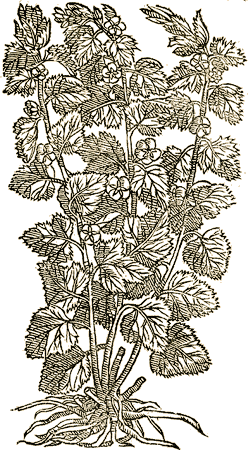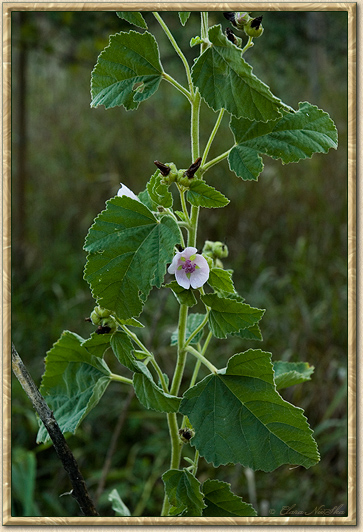|
|
II. The Indispensable Water Remedy.
In order to control dryness and hardness we have to be able to move in water to moisten and soften. There is no better remedy than Marshmallow, the great mucilage and emollient.
Althea officinalis. Marshmallow.
Marshmallow is native to salt marshes along the ocean in Europe, but is widely cultivated and naturalized in the New World. It can also grow along inland waterways and ditches. The root and leaves contains large amounts of mucilage and pectins, sugars, flavonoids, tannins, salt, and phenolic acids. Hollyhock (Althea rosea) and low mallow (Malva neglecta) are used as substitutes or cognates.
|
 |
 |
The flowers, leaves and roots of marshmallow and many of its cousins have been used around the world as a source of a mucilage which is moistening, soothing, anti-inflammatory, and softening. It is the most anti-inflammatory of the common mucilages. It is salty and is therefore also diuretic and emollient. As an emollient it will soften and break up hard tissue (water follows salt). These properties give it a broad, general, nonspecific applicability as a palliative or curative in almost any hot, dry, hard condition. It would appear from the length of the account given by Nicholas Culpeper that it was one of his primary remedies and that he used it in a general way for a wide variety of conditions. He mentions saving his son from dysentery with marshmallow. It is very important as a palliative in such serious bowel diseases as Crohn's disease and colitis, though it is not usually curative.
Although althea has a broad, general application on the mucosa throughout the body, it has a specific relationship with the kidneys. This is not surprising for a salty mucilage. It has been called the ‘most diuretic of the mucilages’ and ‘the most mucilaginous of the diuretics.’ It has a soothing operation on the kidneys and bladder while at the same time increasing diuresis. The famous early nineteenth century London herbalist, Samuel Westcott Tilke wrote, “I have given it successfully for gravel; and to persons of a costive habit of body, I believe nothing can surpass it. If it be taken every day for a month, in a decoction or infusion, if will, from its oily nature, entirely do away with the necessity of ‘forcing’ medicines, which do more harm than good” (Webb, 1912, 232).
The job of the kidneys is to balance the water and solids. Some interesting symptoms related to this were described by two different students at a lecture I gave. One reported that marshmallow was beneficial for dried out people who lacked thirst, while the other said it was good for people with an excessive thirst and copious urination. We often see exact opposites treated by a single herbal medicine because these natural remedies are normalizers that reestablish balance rather than drugs, which force the body.
A good specific indication for althea is a tongue that is red and dry, with a glazed, shining surface, sometimes with horizontal breaks or cuts in the glaze. This indicates dryness, hardening, and heat (Matthew Wood).
Althea has long been used externally. Galen considered it particularly effective for preventing the formation of pus. He recommended making a cataplasm by cooking althea roots in water, adding barley flour, and cooking for a long time (Ad Glauconem II). One student recommended from experience that use of a wash of marshmallow on dry eczema and psoriasis. It also has a lubricating effect on the knees and joints.
Berkeley herbalist Pam Fisher, who has worked with many cancer patients and survivors, says that “marshmallow is going to be your best friend” during chemotherapy. People will fare through chemo “magically.” Drink 1/2 gallon of a cold extraction of the root per day. It is, in my experience, nearly a specific for smokers, or recent smokers, who have dried out, over heated membranes.
David Dalton (2006, 60) gives an extensive account of Althaea officinalis as a flower essence. He considers it to be a remedy for hardening of the personality, inflexibility, hardheartedness, intolerance, and inability to feel one’s emotions. He looks upon it as a heart remedy that helps keep the heart in contact with and regulating the lower chakras and strong emotions. He mentions it also for hardening of the arteries. I have noticed that marshmallow will sometimes bring down high blood pressure.
Taste: (root) salty, sweet • cool • mucilaginous
Tissue State: atrophy and excitation dependent on lack of moisture

Specific Indications
Mind, Senses, Nerves, Emotions, Personality
– Inflexible, narrow-minded, emotionally rigid or unfeeling.
– Hardhearted, insensitive, unsympathetic.
Head
– Eyes, sore, inflamed (external).
Mucosa
– Lips red, dry, sometimes with a slight white powder around them.
– Tongue red, dry, glazed, burnished, horizontal cracks; with dry coating.
– Irritated, inflamed, hot, dry mucosa.
– Sore throat.
Lymphatics
– Swollen, hard, indurated glands (external).
Respiration
– Dry cough in the throat or upper bronchus; in children; worse at night (syrup).
– Congestion, catarrh, hardened mucus.
– Bronchitis and asthma.
– Whooping cough.
– Emphysema.
Digestion
– Soothing and anti-inflammatory to the digestive tract; acid stomach, burning (capsules).
– Over-acidity, ulcers, gastric, duodenal, mucus colitis (roots).
– Low enzyme production (leaves) with gastric acidity (leaves and roots).
– Diarrhea, dysentery, Crohn's disease (palliative), colitis (capsules, tablets).
– Constipation.
– Hemorrhoids (external).
Kidneys and Bladder
– Painful, scanty urination; soothes the passage of stones.
– Cystitis, strangury, hematuria.
– Gravel.
Female
– Lactation: nipples, sore (external).
Muscular and Skeletal
– Arthritis in knees; with dry mucosa, tongue red, dry, latitudinal cracks (cured).
Skin
– Sores, ulcers, burns, boils, and inflamed skin (external).
– Skin red, dry, with white powder exfoliating.
Other
– High blood pressure with water retention.
– Diabetes.
– Chemotherapy.
– Thirst with copious urination or no thirst with systemic dryness.
Preparation and dosage:
The flowers, leaves and roots are used somewhat interchangeably. However, “marshmallow root has been used primarily in the digestive system, and leaf in the urinary system and lugns” (Hoffmann, 2003, 526). The leaves are harvested just before flowering to enhance the mucilaginous extraction (Bisset and Wichtl, 2001). Mucilage extracts poorly in alcohol, so it is often used in capsules or tablets. The root is best cold extracted in water (Michael Moore). The root and leaf can be used in a tincture, as a specific remedy, rather than as a general mucilage.
Cautions:
None known (German E Commission; Bisset and Wichtl, 2001).
Literature:
Traditional, David Dalton (1, 2), Nicholas Culpeper (18), Margi Flint (4), Dorothy Hall (15, 16), William LeSassier (16), Samuel Westcott Tilke (18, 22), John William Fyfe (14, 15, 17, 20, 21), Matthew Wood (5, 6, 24, 26, 27), A. W. and L. R. Priest (19), Louise Tenney (3, 7-13, 17, 18, 21-23, 25, 28), Pam Fisher (29).
Selections from The Earthwise Herbal
By Matthew Wood M.Sc. (Herbal Medicine)
Registered Herbalist (AHG)
To be published by North Atlantic Books, in two volumes, 2008-9
"In a busy practice covering over twenty five years and tens of thousands of clients, a person learns what remedies are of invaluable service. I would like to share my selection – herbs I choose and herbs that choose me."
|
|